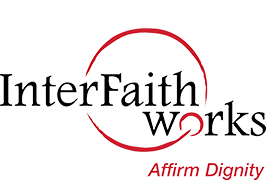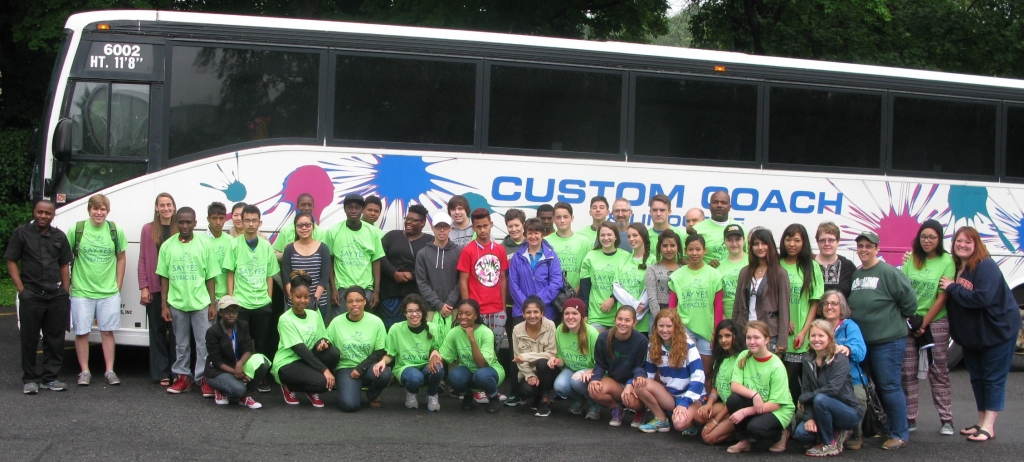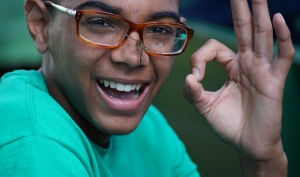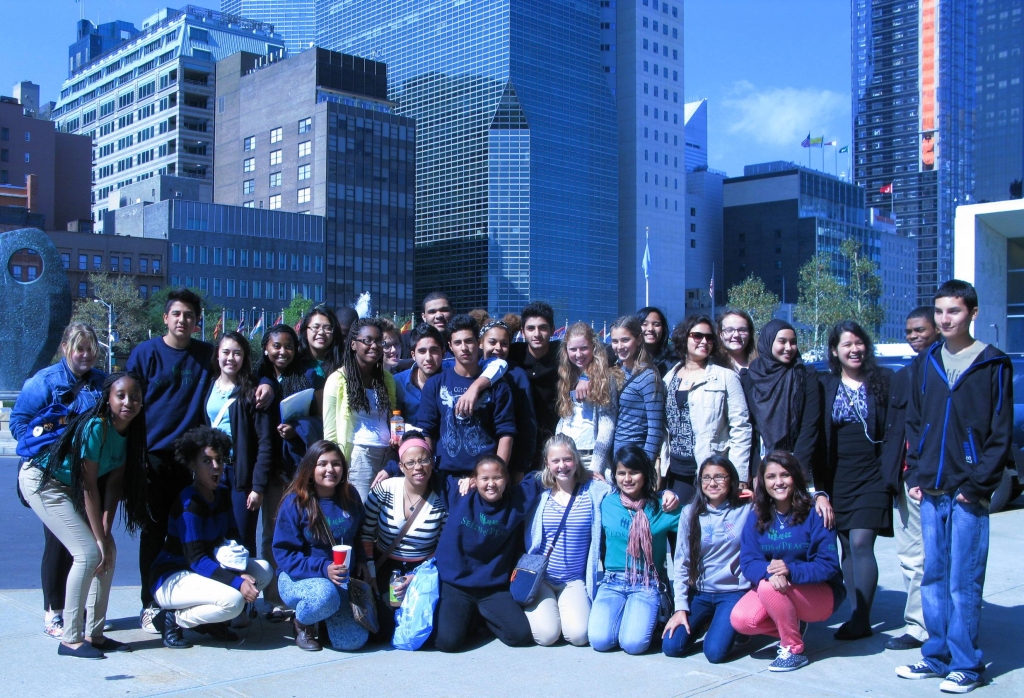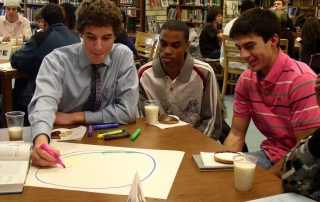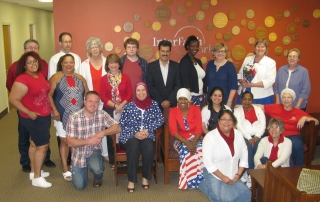Welcome to the InterFaith Works Blog. Our Blog will feature a variety of agency-related authors and be a hub of conversation about the issues we care about. It will serve as a place where we will connect with you regularly to discuss timely issues that focus on our common appreciation for and investment in the Greater Syracuse and Central New York communities, our nation and the world at large.
Planting the Seeds of Peace
Youth leadership program in Syracuse area
works to break down religious and cultural barriers
Finding successful ways to break down cultural and religious barriers throughout the world has been a growing concern for governments, communities and individual citizens. A youth group in the Syracuse area, the Seeds of Peace, is working at the grass roots level to encourage positive and accepting behavior among youth to change the course of conflict. In 2011, the Seeds of Peace program, a New York City-based non-profit that runs a summer camp in the state of Maine, was expanded to Syracuse in an effort to help with the city’s constantly evolving demographics and issues of youth conflict and violence in schools. The Syracuse Seeds of Peace program was initiated as a partnership with Say YES to Education, the Syracuse City School District, Seeds of Peace (national), Onondaga County and InterFaith Works.
The Seeds of Peace program in Maine was originally created to bring together Israeli and Palestinian youth for two weeks at a summer camp in an attempt to create new mindsets and behavior in two groups that have been at odds for centuries. The fledgling Syracuse program decided this would be a great opportunity to have the Syracuse members collaborate with the Maine members to foster acceptance and cooperation among the diverse youth in our area.
“After students return from a two-week session in Maine, they are asked to develop clubs and events that encourage the values of Seeds of Peace,” explains Greg Barker, Seeds of Peace coordinator for InterFaith Works. “They are encouraged to become dialogue leaders and help to address the levels of negativity that can be associated with a diverse community like Syracuse.”
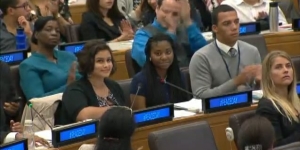
Ranya Shannon (center row left) and Cimone Jordan (center row right) speak at the United Nations International Day of Peace in September, 2014
The success of the program is illustrated by a child of Syracuse University Professor Tula Goenka. Her daughter, Ranya Shannon, is a graduate of Nottingham High School in Syracuse. Ranya’s experience in Seeds of Peace was life changing, and has encouraged her to pursue an international diplomacy path of study at American University in Washington, DC. Having been a rather disconnected teen that needed a direction, Ranya was urged by Tula to consider joining the Syracuse Seeds of Peace program. She was reluctant to apply, missed the deadline, and then had no idea what to expect as the bus left for Maine two summers ago. The eight-hour trip gave her plenty of time to contemplate what lay ahead.
“Even in your first few moments arriving at the camp, they really shower you with love and acceptance, and it’s a vibe that you really need and feed off of,” says Ranya. “The more time you spend there, the more dialogue opens up and develops with all members of the camp. The awkwardness sheds and you feel really comfortable to reach out to others through the various workshops and meetings.”
Modeled after the initial camp to improve Israeli and Palestinian relations among youth, Ranya was able to see how easy it can be to reach out to others and develop an inviting persona. By working through their ideas and opinions, and through the encouragement of constant dialogue, the “seeds” build more confidence in their own convictions and in the acceptance of others’ alternative belief systems.
“I did not realize how valuable it was to see things from others’ perspectives until I had gone through the program. You leave seeing issues through other peoples’ eyes, and that is the most valuable take away,” says Ranya. “One of my favorite parts of camp was attending the open religious services for Muslims, Jews, Christian Catholics and Quakers. Although I do not attach myself to any particular faith, it allowed me to experience their similarities and differences.
“In September 2014, another “seed” from Fowler High School and I were given the opportunity to speak before members of the United Nations and other dignitaries during International Peace Day in New York City,” she continues. “It encouraged us to attempt to address the ‘lunch room’ problem, in which various races, nationalities and religions segregate themselves to certain areas of the room.”
She said it took some time to encourage dialogue among each group, and her work to break down barriers made her mother very proud. Tula knew Ranya held great potential, and she hoped that Seeds of Peace would provide that outlet for her to achieve great things.
“I am so thankful for the way it changed her life, opening up her mind to diverse religious observations and the overall acceptance of other people,” says Tula. “Because of this program, she has learned more about the Middle East situation and she is learning Arabic. I just think it’s great.”
Tula has witnessed first-hand the success of the program, but it is up to each individual and their perception of social justice to continue the mission of Seeds of Peace. In Ranya’s case, she not only planted the seed, but has cared for it over the last two years. Whether it is religion or social justice, keeping dialogue open will help produce these valuable “seeds” of change.
If you would like to learn more about the Syracuse Seeds of Peace Program, contact Dialogue Coordinator Greg Barker, at 315-449-3552, ext. 125, or email gbarker@interfaithworkscny.org.
Follow this link for the Syracuse Seeds of Peace page on the Syracuse City School District website.
Follow this link to the national Seeds of Peace website.
